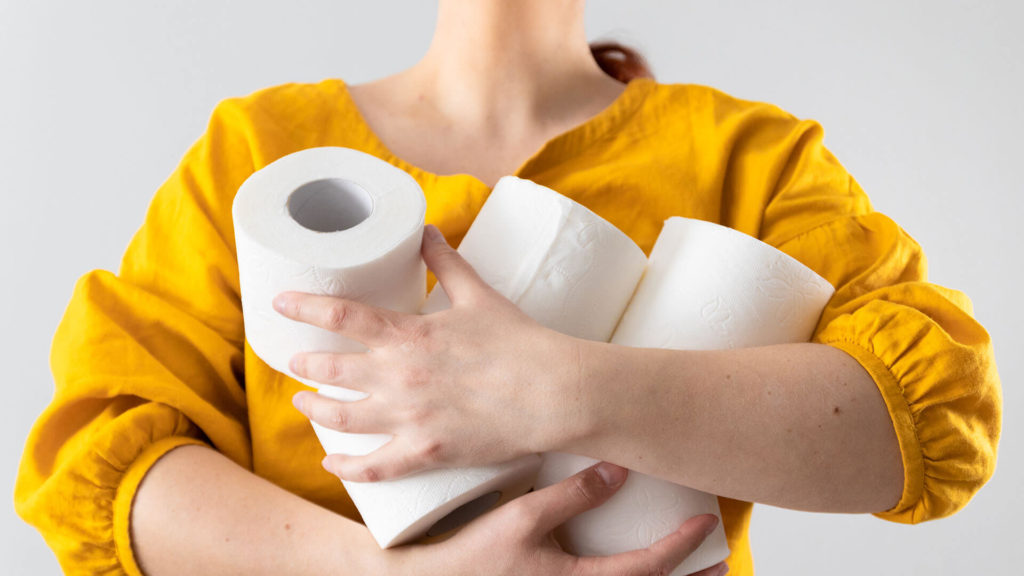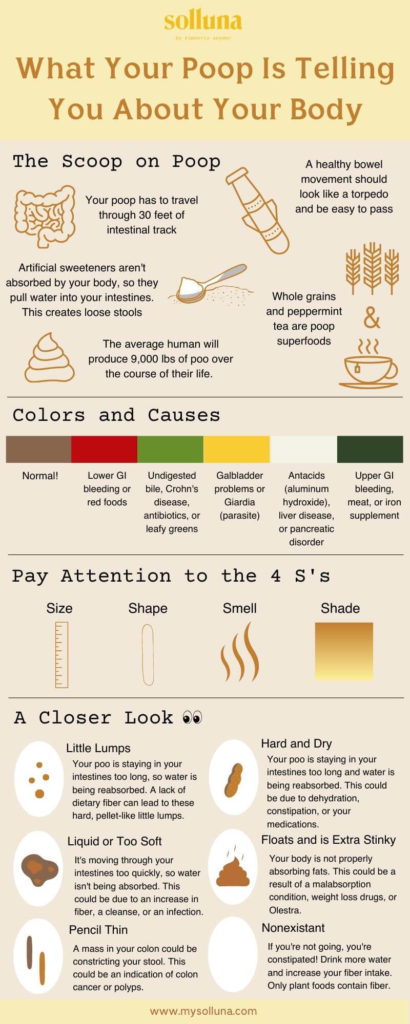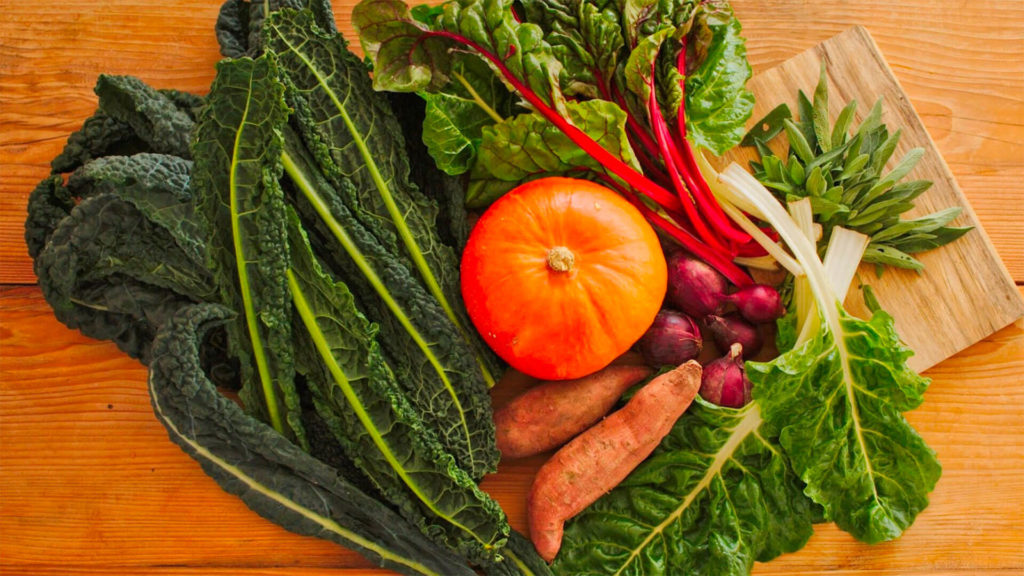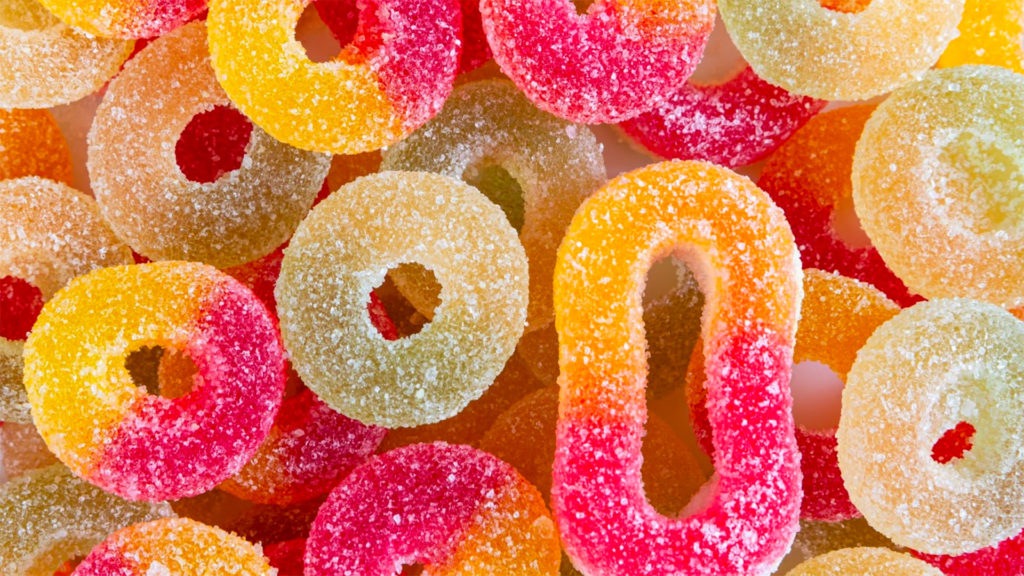
Over 10 years ago we published an article What Your Poop and Pee are Telling You About Your Body and it went viral!
This is one of those topics that everybody wonders about but never wants to ask about. The second Solluna True Beauty Cornerstone is Body, and how healthy your body functions is directly related to your bowel movements, so we felt it was time to update the original article from so many years ago!
Everybody poops.
It’s a natural process, and ridding your body of waste is an essential bodily function. Your poop can tell you about your health. Healthy poop is a sign of wellness, while unhealthy poop is a sign that something is “off” or not functioning as well as it can be.
Some change with bowel movements are normal, or short-lived, so how do you know if your poop is healthy or if changes are needed?
Thankfully, if you normally have a healthy poo it’s easy to tell if something is amiss. So let’s take some time to answer those questions that everyone is wondering about, but no one wants to ask. :)
What is Poop, Really?
Everyone knows what poop is, but do you really know what makes poop what it is? Poop— also known as feces or stool— is the end-product of your digestive system. It’s all the waste products that are being eliminated from your body. It can include:
- Undigested food matter
- Salts
- Bacteria
- Other substances your body couldn’t digest, like fiber
Did you know that the average human will produce 9000 pounds of poo over the course of their life. That’s a lot!
It’s not a short journey for each bowel movement either. From your stomach to the end of your large intestine, It has to travel through about 30 feet of digestive tract! It’s important to have healthy bowel movements to keep your body free of waste— I recommend at least one healthy bowel movement a day.
Related: How Often Should You Poop?
What Your Poop Can Tell You About Your Health
If your body is healthy, it’ll show in your stool. Unfortunately, if you’re unhealthy your poop will show it too. The color, texture, shape, odor, and amount of poop in each bowel movement can be a surprisingly detailed look into your overall health. Check out my infographic below to learn more!
What Healthy Poop Should Look Like
A healthy, normal poop can vary from person to person, but as a general rule it will look a certain way.
An easy way to know whether or not your poop is healthy is to remember the Four S’s:
- Shape
- Size
- Smell
- Shade
So what exactly does this mean when evaluating your personal poo? Here’s what you want to see:
Shape
Your poop is soft to firm in texture, and passed in either one single piece or a few smaller pieces. Ideally, a healthy bowel movement should be shaped like a torpedo.
Size
You want bowel movements that are not so big they’re hard to release. Your poo should be easy to pass with minimal straining.
If you consistently can’t go to the bathroom in days, and it’s a large and difficult to pass poo, then you likely have constipation and need to up your fiber intake, water intake and focus on healthy gut flora balance.
Smell
If your poo stinks that’s okay, it should smell. The bacteria in your poop emit gases that give it its signature stink.
If you have one or two occurrences where your bowel movement spells different or particularly stinky, it’s likely from something you ate or drank. Meat and dairy contribute to the stench along with sulfur rich foods or a food you’re intolerant of.
If it’s consistently different from what your poop “normally” smells like, there may be something else going on.
What Causes Foul-Smelling Stools That are Cause for Concern?
Malabsorption can cause smelly bowel movements. That’s when your body can’t properly absorb nutrients from your food. There are many reasons you can’t absorb nutrients properly, some are more serious than others.
You may not be able to properly absorb nutrients because of an imbalance of gut flora in your microbiome, food allergies, dairy intolerance, and carbohydrate intolerance. More serious issues include diseases like celiac disease, inflammatory bowel disease, ulcerative colitis or Crohn’s disease.
Medications can affect the smell of your stools too. For example, antibiotics can disrupt the flora in your gut and cause an odor until balance is restored.
Constipation is another cause of foul odor, the longer your excrement takes to eliminate, the smellier it is.
Shade
Healthy stool should be medium to dark brown in color.
While you probably don’t have a habit of looking into the toilet bowl very often, it’s important to be aware of any changes in your bowel movements. If your poop has any changes in smell, consistency, frequency, or color, it could be a sign of potential health problems, a need to change what you’re eating or a need to seek expert help.
What Unhealthy Poop Looks Like
Now that you know what healthy poop looks like, it’s time to talk about what unhealthy poop looks like. Basically, if your bowel movements are inconsistent with what I’ve already shared, you may need to make some changes to your diet and food choice or in more serious instances seek advice from an expert in digestive disorders.
From stool color to consistency, these are the major red flags to look for:
Abnormal Poop Color
Red poop
This can be a sign of lower gastrointestinal bleeding. It can also be a sign that you’ve just eaten a lot of beets!
Green poop
This is the least “abnormal” color, and many may even consider this a “normal” stool color. If your poo is green it may just mean you’ve changed your diet or food is making its way through your large intestine faster than normal (which may prevent your bile, a greenish fluid, from breaking down and changing color).
More serious causes include digestive disorders like Crohn’s Disease, Ulcerative Colitis, Irritable Bowel Syndrome, or Inflammatory Bowel Disease.
But it also may simply be a sign that you’ve eaten a lot of leafy greens like spinach and kale!
Yellow poop
You may have a problem with your gallbladder, or a giardia infection. [1]
White poop
White or pale stools often means bile isn’t traveling through your GI tract. Bile helps your body digest fat and it changes to a brown color as it interacts with certain enzymes. Some of the more serious causes include gallstones, pancreatic disorders, or can be a sign of liver disease.
If you’ve taken a lot of antacids it can also turn your stool a pale or white color.
Black poop
This can be a sign of upper gastrointestinal bleeding. You may also have black stool if you eat meat or take iron supplements.
Not all changes to your stool color are reason for alarm. So before you get too worried, pay attention to what you’ve been eating. Foods will change the color of your stool temporarily (unless you’re eating beets daily!), and making a few dietary changes can be an easy fix.
If the changes accompany severe pain, unwanted or unexpected weight loss, vomiting or a fever contact your doctor.
Loose Stool or Hard Stool
Liquidy or mushy stool— otherwise known as diarrhea— is incredibly common, although it doesn’t have to be! When you have diarrhea you may also experience nausea, abdominal pain, or more frequent bowel movements. This is because waste is moving through your digestive tract too quickly. It’s often a sign of other health issues, such as dehydration or stomach problems.
On the other hand, hard, dry or more infrequent stool— constipation— is a sign that your poop is staying in your digestive tract for too long. It’s also a sign that your large intestine is absorbing too much water.
Related: Are Laxatives Dangerous? 4 Steps to Natural Constipation Relief
Shape
Remember how I said above that healthy poop should be shaped like a torpedo? If it’s not shaped like that, then something could be wrong.
If your poop comes out in little lumps, it can be a sign that you’re constipated and not getting enough fiber in your diet to bulk up your stool. It can also point to dehydration.
If it comes out in one long, pencil-thin piece, you may have an obstruction in your bowels, or you may have a medical issue like IBS. With irritable bowel syndrome your stool doesn’t spend enough time in your colon to bulk up.
3 Simple Tips for Better Gut Health and Normal Bowel Movements
Your digestive system is a very intricate part of your overall health. When it’s working the way it’s supposed to, you probably feel great! But if it’s not, then you’re probably feeling pretty uncomfortable. But don’t worry Beauty— improving your gut is super easy!
Check out my 3 easy tips for healthy digestion and better bowel health, and I think you’ll be amazed by how easy it really is.
1. Eat More Plants!
A plant-based diet is one of the best ways to help boost your gut health and keep yourself regular. That’s because a healthy plant-based diet is rich in dietary fiber and whole grains help keep things moving. Not only that, but meat and dairy are major culprits of digestive problems— from bloating and gas to indigestion and constipation.
Some amazing “poop superfoods” to eat include:
- Leafy greens like kale, spinach, and collard greens.
- Whole grains like quinoa, brown rice, and teff. These are gluten-free as well, which is especially good for you Beauties with gluten intolerance or celiac disease!
- Peppermint tea. Peppermint has been used medicinally for hundreds of years. This invigorating and refreshing tea can help relieve digestive symptoms like indigestion, bloating and gas.
Related: Meat Vs Plant-Based Diet Effect On Gut Bacteria
2. Avoid Artificial Sweeteners
Artificial sweeteners are sadly common nowadays— and not just in sweet treats. They can even be found in things like cough drops! To keep your gut healthy, make sure to avoid artificial sweeteners as much as possible.
Two specific sweeteners— sorbitol and mannitol— can be especially bad for your digestion. That’s because these two can spend a long time in your stomach, which can cause bloating and diarrhea. [2]
Not only that, but the FDA requires that food with more than 50 grams of these sweeteners list a potential laxative effect on the label. Yikes!
3. Take the Right Supplements
There are a lot of digestive supplements out there Beauty. From fancy probiotics to detoxes, a lot of them make big promises but don’t deliver. Not to mention, a lot of them are not as good for you as they advertise.
So what should you be taking? I think taking a good soil-based probiotic and healthy digestive enzymes are an absolute must.
Most probiotics don’t even make it to your gut because they can’t survive in your stomach. Soil-based probiotics are much hardier than other probiotics, and can survive in your digestive system for much longer. That means they’re much more likely to get to where they need to go so they can help boost your gut health! Not only that, but these soil-based organisms (SBOs) are 100 percent plant-based— unlike other probiotics that are derived from dairy and animal byproducts.
But what about digestive enzymes? While your body makes these on its own, some foods are naturally high in beneficial digestive enzymes— like pineapple and fermented foods. The best way to get digestive enzymes in your diet is to eat a balanced plant-based diet, but a digestive enzyme supplement can give your digestion an extra boost too.
To give your gut health an extra boost, I recommend my Feel Good Starter Kit. It contains specially formulated SBO probiotics, digestive enzymes, and my Feel Good Detoxy 2.0— for when you feel like your digestion needs an extra boost. These 100 percent plant-based formulas are designed to keep your digestion regular and your gut healthy.
And when you feel beautiful on the inside, you become even more radiant on the outside. :)
Related: Healthy Digestion and Elimination Tips and Tools
The Scoop on Poop
Remember, everybody poops. It may not be something you want to ask questions about, but it’s so important that you do!
Healthy poop is a sign that your body is healthy and everything is working the right way. But unhealthy poop can be a sign that something is wrong. Knowing what a healthy poo looks like can help you know right away if something is amiss in your body. And even if your digestion isn’t where you want it to be, there are several things you can do to help improve your digestion right away!
So don’t be afraid to ask those hard questions about your health— even the stinky ones. :)
Citations
- “Giardia Infection (Giardiasis).” Mayo Clinic, Mayo Foundation for Medical Education and Research, 16 July 2021, www.mayoclinic.org/diseases-conditions/giardia-infection/symptoms-causes/syc-20372786.
- Orenstein, Beth W, et al. “Is Your Diet Giving You Diarrhea?” Everyday Health, www.everydayhealth.com/diarrhea-management-photos/diarrhea-and-diet.aspx.






Thank you for this Kimberly. I am very regular. So I guess I am doing something right :). Still I do take your probiotics digestive enzymes and on occasion when I think i need it the Detoxy. I find my digestive system has reacted nicely to these. And I try to eat the right foods and stay healthy we all cheat sometimes. I am a meat eater. But I do eat more vegetables and the smoothies are great. I like to try new things from time to time and have nights where I cut out meat entirely now so that is something. :) Anyways, this is becoming a novel. I just mean to say thank you for this email and information. And for all you do.
Thank you so much love, for sharing your personal wellness routine! I think it’s great that you’re listening to your body and making the adjustments here and there. Not sure if you keep a journal but I find it always helps me to keep notes of what I’m eating so that when I see good or poor shifts, I can go back to my notes and see where I can make more adjustments. I love that you’re incorporating veggies and smoothies (and Solluna supplements!) into your routine too. If you’re bowels are doing good, you must be doing something good, right?! So much love to you Gillian and thanks again for sharing your journey and kind comments! Xo
Thank You..